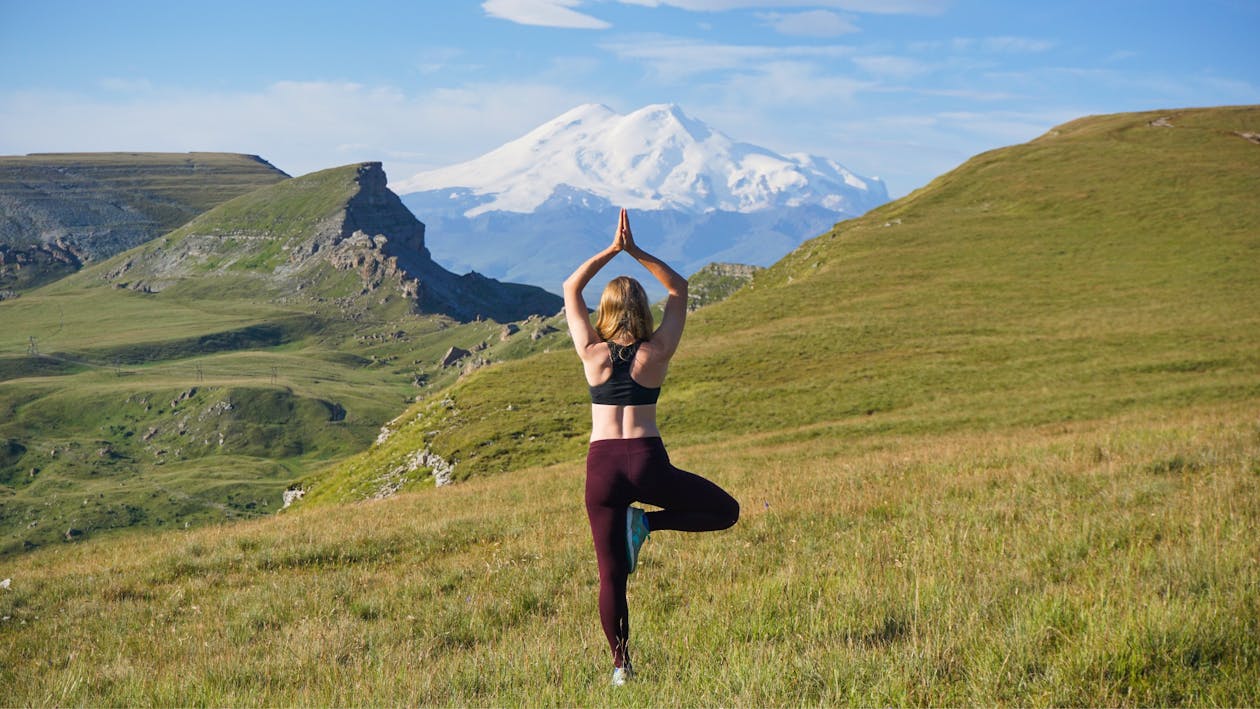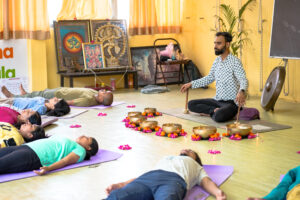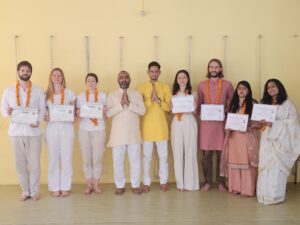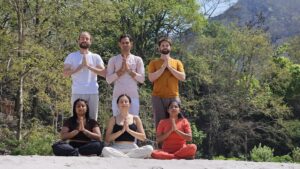Yoga has become widespread for enhancing physical health, mental clarity, and spiritual well-being. Among the various forms of yoga, two of the most well-known styles are Hatha and Ashtanga. While they share common roots, their approaches and techniques can vary greatly. In this blog, we’ll explore the key differences between Hatha and Ashtanga Yoga, exploring their history, techniques, benefits, and how they can suit different needs and goals.
What is Hatha Yoga?
Hatha Yoga is often considered the “foundation” of all physical yoga practices. The word “Hatha” is derived from two Sanskrit terms: “Ha,” meaning “sun,” and “Tha,” meaning “moon.” These represent the balance of opposites — the active and the passive, the masculine and the feminine, or the solar and lunar energies within the body. Hatha Yoga emphasizes physical postures (asanas), breath control (pranayama), and meditation to bring harmony and balance to the body and mind.
Hatha Yoga is a broad category that encompasses a wide variety of practices, including gentle stretching, deep breathing techniques, and mindful relaxation. While it can be physically demanding, it is generally slower-paced and more accessible for beginners, as it focuses on building strength, flexibility, and alignment through mindful movements.
Key Characteristics of Hatha Yoga:
- Gentle and Accessible: Hatha classes typically involve slower, gentler movements and stretches, making them more suitable for beginners or those with specific physical limitations.
- Focus on Breathwork: Conscious breathing is a significant component of Hatha Yoga. Techniques such as pranayama (breath control) are often incorporated to deepen relaxation and energy flow.
- Holistic Approach: While the primary focus is on the physical postures, Hatha Yoga also integrates meditation and mindfulness for mental clarity and emotional balance.
- Flexibility and Strength: The slow pace of Hatha allows practitioners to explore the full range of motion in their bodies, improving flexibility, strength, and posture over time.
Benefits of Hatha Yoga:
- Stress reduction and emotional balance.
- Improved flexibility and muscle tone.
- Mindfulness and mental clarity.
- Improved breathing and lung capacity.
What is Ashtanga Yoga?
Ashtanga Yoga is a more structured and dynamic form of yoga, rooted in ancient traditions but made popular by Sri K. Pattabhi Jois in the 20th century. The word “Ashtanga” means “eight limbs” in Sanskrit, which refers to the eight-fold path outlined in the ancient yoga text, the Yoga Sutras of Patanjali. This path includes moral guidelines, physical postures, breath control, concentration, and meditation.
In Ashtanga Yoga, the physical practice is organized into specific sequences of asanas, which are practiced in a set order. There are six primary series in Ashtanga Yoga, ranging from the Primary Series (Yoga Chikitsa) to the Advanced Series (Sthira Bhaga). Each series is designed to purify the body and mind, promoting both strength and flexibility through a consistent and disciplined approach.
Key Characteristics of Ashtanga Yoga:
- Dynamic and Rigorous: Ashtanga is a vigorous, fast-paced practice that involves continuous movement, with each posture linked to the next through a synchronized breathing technique known as vinyasa.
- Set Sequences: Unlike Hatha Yoga, which often involves varied sequences depending on the class, Ashtanga follows a fixed sequence of poses. The practitioner repeats these sequences in a specific order, which helps to build consistency, strength, and stamina.
- Breath and Movement Coordination: In Ashtanga, each movement is coordinated with the breath in a process called Ujjayi breathing (victorious breath). This breath-control technique helps to create internal heat and enhances focus during the practice.
- Self-Discipline: Ashtanga is often practiced in a self-led manner, especially in the Mysore style, where each practitioner works through the sequence at their own pace, with minimal guidance from the teacher. This fosters independence and self-discipline.
Benefits of Ashtanga Yoga:
- Enhanced strength and endurance.
- Increased flexibility and joint mobility.
- Detoxification through sweating and controlled breathing.
- Mental focus and clarity from the repetitive practice.
Key Differences Between Hatha and Ashtanga Yoga
- Pacing and Intensity:
- Hatha Yoga tends to be slower-paced and more meditative, with a focus on holding postures for longer periods to improve alignment and flexibility.
- Ashtanga Yoga, on the other hand, is much faster and more physically demanding, with continuous movement linking each pose to the next in a dynamic flow.
- Flexibility vs. Strength:
- While both practices improve strength and flexibility, Hatha Yoga places a greater emphasis on gentle stretching and deep relaxation.
- Ashtanga Yoga demands more strength and stamina, as practitioners must engage their muscles throughout the entire sequence, especially in arm balances and standing poses.
- Structured vs. Variable Practice:
- Hatha Yoga classes are more variable and can incorporate different styles or techniques depending on the teacher and the class format.
- Ashtanga Yoga follows a set sequence, which means the practice is more predictable and consistent but can feel repetitive for some.
- Suitability for Beginners:
- Hatha Yoga is generally more accessible for beginners due to its slower pace and emphasis on alignment and flexibility.
- Ashtanga Yoga, due to its fast pace and demanding nature, may be challenging for those new to yoga, though it is possible to modify poses and build up to the full practice over time.
- Philosophical Foundation:
- Hatha Yoga is often viewed as a gentle introduction to yoga, with a focus on balancing physical, mental, and spiritual aspects.
- Ashtanga Yoga is deeply rooted in the eight limbs of yoga as outlined in the Yoga Sutras, which provide a more disciplined and spiritual path.
Which yoga Style is Right for You?
Choosing between Hatha Yoga and Ashtanga Yoga depends on your personal goals, fitness level, and the kind of yoga experience you’re looking for.
- Hatha Yoga may be better if you are looking for a gentle introduction to yoga or prefer a slower, more mindful practice. It is also an excellent choice if you seek to relax, reduce stress, and improve flexibility without feeling overwhelmed by intense physical exertion.
- Ashtanga Yoga might be the right fit if you seek a more challenging, dynamic practice that builds strength, stamina, and flexibility through a structured, disciplined approach. If you thrive in an energetic, fast-paced environment and enjoy the consistency of a set sequence, Ashtanga will offer you the mental and physical challenge you’re seeking.
Both styles profoundly benefit the body and mind, and many practitioners enjoy incorporating both into their routines. Whether you choose Hatha or Ashtanga, both offer pathways to greater health, mindfulness, and self-awareness, each with its unique approach.
Final Thoughts
In the world of yoga, there is no “one-size-fits-all” approach. Hatha Yoga and Ashtanga Yoga offer distinct yet complementary practices that can enhance your life differently. Whatever your choice, remember that the true essence of yoga is not just in the postures but in the practice of mindfulness, discipline, and personal growth.
Ready to deepen your yoga practice and experience the transformative power of yoga? Whether you are drawn to the gentle flow of Hatha Yoga or the dynamic sequences of Ashtanga Yoga, Upasana Yogshala offers the perfect setting for your journey. Join us for a 15 days yoga retreat in Rishikesh for short-term courses and 200 hour yoga teacher training in Rishikesh to rejuvenate your body, mind, and soul, or take your practice to the next level with our yoga teacher training school in Rishikesh.
Immerse yourself in the ancient teachings of yoga, surrounded by the serene beauty of the Himalayas. Whether you’re a beginner or an experienced yogi, our programs are designed to meet your needs and guide you toward greater inner peace and self-awareness.
Visit Upasana Yogshala today to learn more and secure your spot for a life-changing yoga experience! Register Now!
ALSO READ: Transformative Resonance: Exploring the Power of Sound Healing
Elevate Your Practice: Upasana Yogshala vs. Other Yoga Teacher Training Schools




